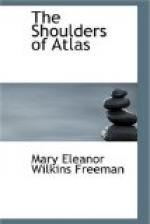“You don’t suppose they’ll send them to prison?” she said.
“They’ll both be acquitted,” said Horace. “Don’t worry, Mrs. Whitman.”
“I’ve got to worry. How can I help worrying? Even if poor Lucinda is acquitted, lots of folks will always believe it, and her boarders will drop away, and as for Hannah Simmons, I shouldn’t be a mite surprised if it broke her match off.”
“It’s a dreadful thing,” said Henry; “but don’t you fret too much over it, Sylvia. Maybe she killed herself, and if they think that Lucinda won’t have any trouble afterwards.”
“I think some have that opinion now,” said Horace.
Sylvia sniffed. “A woman don’t kill herself as long as she’s got spirit enough to fix herself up,” she said. “I saw her only yesterday in a brand-new dress, and her hair was crimped tight enough to last a week, and her cheeks—”
“Come, Sylvia,” said Henry, admonishingly.
“You needn’t be afraid. I ain’t going to talk about them that’s dead and gone, and especially when they’ve gone in such a dreadful way; and maybe it wasn’t true,” said Sylvia. “But it’s just as I say: when a woman is fixed up the way Miss Eliza Farrel was yesterday, she ain’t within a week of making way with herself. Seems as if I might have had forethought enough to have got that kitten for poor Lucinda.”
Sylvia went out again. The men heard the rattle of dishes. Horace rose with a heavy sigh, which was almost a sob, and went out by the hall door, and Henry heard his retreating steps on the stair. He frowned deeply as he sat by the window. He, too, was bearing in some measure the burden of which he had spoken. It seemed to him very strange that under the circumstances Horace had not explained his mysterious meeting with the woman in the grove north of the house the night before. Henry had a certainty as to her identity—a certainty which he could not explain to himself, but which was none the less fixed.
No suspicion of Horace, as far as the murder was concerned—if murder it was—was in his mind, but he did entertain a suspicion of another sort: of some possibly guilty secret which might have led to the tragedy. “I couldn’t feel worse if he was my own son,” he thought. He wished desperately that he had gone out in the grove and interrupted the interview. “I’m old enough to be his father,” he told himself, “and I know what young men are. I’m to blame myself.”
When he heard Horace’s approaching footsteps on the stair he turned his face stiffly towards the window, and did not look up when the young man entered the room. But Horace sat down opposite and began speaking rapidly in a low voice.




